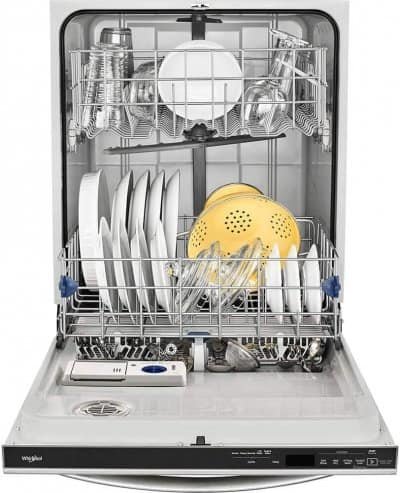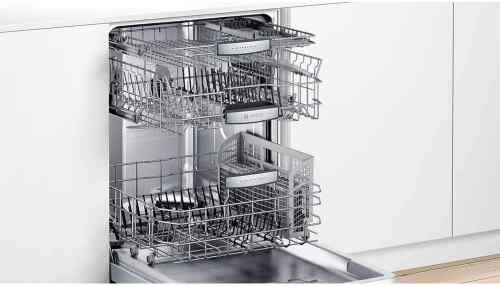No one wants to smell wet dog when they open their dishwasher. Unfortunately, this is a common problem that many homeowners face. While it can be an unpleasant experience, the good news is that the smell can typically be resolved with a few simple steps. Let us discuss the causes of dishwasher odors and provide some helpful tips for eliminating them. We will also explore ways to keep your dishwasher smelling fresh and clean in the future.
Table of Contents
Causes of Wet Dog Smell:
Wet dog smell can come from a variety of sources within your dishwasher. Let’s discuss some of the most common causes of wet dog smell in dishwashers and how to address them accordingly.
The first cause is often blocked drainage or why does my dishwasher smell like wet dog. If food and other organic matter has become lodged in the pipes and filters, it can start to decompose, creating an unpleasant odor. To address this issue, make sure that all food particles are regularly removed from the filter before each cycle, and check for any blockages in the drain pipe. Additionally, pour boiling water down the drain at least once every two weeks to help keep it clean.
Other Minor Causes:
The cause is usually some form of bacteria or mold that has taken up residence in the appliance. Bacteria and mold can occur naturally, but they are also encouraged by improper maintenance of your dishwasher. Understanding why these organisms develop, and how to prevent them, can help you maintain an odor-free machine.
Bacteria and mold thrive in moist environments with organic matter such as food particles. During the cleaning cycle, water and detergent combine to remove food from dishes but can leave behind algae, fungi, spores and other microorganisms. If not routinely cleaned out of the dishwasher’s interior surfaces as well as its drain trap, these elements multiply quickly leading to an unpleasant smell like that of a wet dog.

Odor Sources:
It’s likely that this smell is coming from food particles and grease. Food particles and grease can get into the dishwasher over time when dishes are not cleaned properly or too much detergent is used in each cycle. If these food particles and grease accumulate, they can start to create an unpleasant odor.
To avoid this issue, make sure you scrape off large pieces of food before washing dishes so they don’t end up in your dishwasher. Additionally, use the appropriate amount of detergent for each cycle, as extra detergent will cause excess sudsing which can leave behind residue that may lead to the strange odors. Finally, ensure you clean the interior of your machine regularly with vinegar or baking soda to keep it smelling fresh.
Cleaning Cycle:
Many people experience this unpleasant odor in their dishwashers and are often left wondering why it happens. The probable cause of the stench is related to how the cleaning cycle works and how detergent and rinse aid play a role in the process.
When using a dishwasher, detergent and rinse aid should both be added before starting the appliance, as these products help with cleaning. Detergent helps loosen dirt from dishes while rinse aid helps water drain away quickly so that food particles do not linger on surfaces. If either product isn’t added, residue can build up in the machine which will start to stink like wet dog due to bacteria growth caused by dampness in the interior walls of the appliance.
Sanitizing:
When it comes to keeping our kitchens clean and sanitary, there are few tools more helpful than a dishwasher. However, sometimes a dishwasher can start to smell like wet dog, leaving your kitchen less than inviting. But why does my dishwasher smell like wet dog? The answer lies in the cleaning process, hot water and detergents.
Hot water is essential for cleaning dishes thoroughly and killing bacteria. Detergents have enzymes that help break down food particles so that they can be washed away easily. When these two elements are combined in the right proportions, they create an environment hostile to bacteria and other microbes, which will keep your dishes smelling fresh and clean.
Prevention:
This unpleasant odor can be caused by food particles and other debris accumulating in the drain line, or it could indicate a bigger issue. To ensure your dishwasher remains free of odors and continues to function properly, regular maintenance is key.
Regular maintenance helps prevent foul-smelling odors from taking over your kitchen. At least twice a month, it’s important to clean out any food residue left in the dishwasher basket or filters and run an empty cycle with hot water and bleach or vinegar. Doing so will help keep food particles from rotting inside the appliance, which can lead to musty smells like wet dog. Additionally, you should check for clogged drains on a regular basis; if there’s buildup in the drain line, this may also cause an unpleasant odor.
Regular Maintenance Tips:
Regular maintenance can help reduce odors, improve efficiency, and extend the life of your appliance. Here are a few easy tips that anyone can follow to ensure their dishwasher is properly maintained.
First, make sure to clean out the filter regularly. The filter prevents food particles and other debris from clogging up or even damaging the internal parts of your dishwasher. Rinse the filter with warm water and remove any debris before putting it back into place. Secondly, periodically check for any signs of mold or mildew on the door seal, gaskets and dispenser cup inside your machine- this will help prevent odor causing bacteria from developing inside your appliance.
Why does my Dishwasher Smell Like Wet Dog?
There are a few possible reasons why your dishwasher might smell like wet dog. One reason could be that food particles or other debris have gotten stuck in the drain hose and are causing an odor.
This can happen if food is not rinsed off dishes before they go into the dishwasher. Another possibility is that mold and mildew may have built up inside the dishwasher, which can create a musty smell. Lastly, if you live in an area with high humidity, it is possible that moisture has built up inside the dishwasher over time, leading to an unpleasant smell.
To get rid of the smell, start by thoroughly cleaning out your dishwasher. Remove any debris from the drain hose and inspect for mold or mildew buildup on the interior walls of the appliance. If there is any visible mold or mildew, use a cleaner specifically designed for removing it from appliances.
Why does my Dishwasher Smell Like Sewer?
If your dishwasher is smelling like sewer, it could be due to a few different factors. The first thing to check is the drainage system. If you have a clog or blockage in the drain, it can cause water and other debris to build up and create an unpleasant odor.
Additionally, food particles that are not completely washed away can also lead to foul odors. Make sure you are regularly cleaning out the filter and running an empty cycle with a dishwasher cleaner to help eliminate any built-up residue. Finally, if none of these steps help, you may need to call a professional plumber to inspect the dishwasher for any potential issues with the plumbing system.
Why does my Dishwasher Smell Like Rotten Eggs?
If your dishwasher is emitting a smell of rotten eggs, it could be caused by a few different things. Firstly, it could be due to a buildup of food particles and grease that have been left behind after washing. This can create an ideal environment for bacteria to thrive and give off the smell of rotten eggs.
Secondly, it could be caused by a broken or malfunctioning part in the dishwasher itself, such as the drain line or pump. In this case, you may need to call in a professional appliance repair technician to diagnose and fix the issue.
Lastly, if your dishwasher has recently been installed or serviced, it could be due to a chemical reaction from cleaning products used during installation and servicing that are giving off the smell of rotten eggs. In this case, you should contact the installer or service provider for further advice on how to resolve the issue.
Why does my Dishwasher Smell Like Fish?
If your dishwasher has a fishy smell, there are a few potential causes. First, food particles can get stuck in the filter and create an unpleasant odor. To prevent this from happening, make sure to clean the filter regularly and remove any debris that may have accumulated.
Another potential cause of a fishy smell is bacteria growth in the drain hose or pump. If this is the case, you should disconnect the drain hose and inspect it for any signs of mold or mildew. You can also run some bleach through the dishwasher to help kill off any bacteria that may be present.
Finally, if none of these solutions work, you may need to call a professional to inspect your dishwasher and identify the source of the smell.
Why does my Dishwasher Smell Like Sewage?
A smelly dishwasher is an unpleasant experience, and one that can be difficult to diagnose. The most likely cause of a sewage smell coming from your dishwasher is due to a clogged drain or filter. Food particles and other debris can get stuck in the drain or filter, allowing bacteria to grow and produce an unpleasant odor.
To fix this problem, check the drain and filter for any blockages and clean them out thoroughly. Additionally, you may want to use a deodorizing cleaner in the dishwasher to help neutralize odors.
If these steps don’t work, it’s possible that there could be a more serious issue with the plumbing or drainage system of your home. In this case, it’s best to contact a professional plumber for help.
Conclusion:
Concluding that your dishwasher smells like wet dog can be a frustrating and overwhelming experience. However, understanding why this is happening and how to rectify it can be made significantly easier with the right cleaning solutions.
First, identify the source of the smell. Often times, this will stem from excess food particles or grease that have built up over time in various parts of your dishwasher. You can use a vinegar and baking soda solution to help break down the grease and food particles on any hard surfaces within your dishwasher. Additionally, use a specialized cleaner to take care of any mold or mildew buildup inside of your appliance – these types of cleaners are specifically designed for removing odors caused by bacteria growth.

